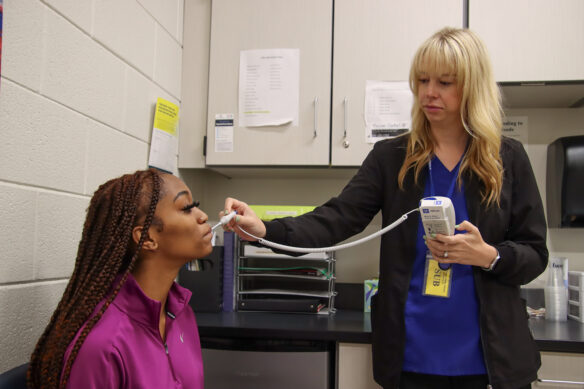
The Kentucky Department of Education’s (KDE’s) School Health Branch has been invited to partner with the National Association of School Nurses (NASN) and its Every Student Counts! initiative.
The Every Student Counts! initiative involves bringing in partners to build an infrastructure that will gather and aggregate student health information into one national data set. NASN plans to do this by promoting access to and effective use of documentation systems, along with the development of standardized data points and definitions for consistency to better understand the connections between health and educational outcomes.
Personal information about children will be unidentifiable throughout the system, but it will allow all children, regardless of their state of health or access to health care, to be represented.
Two members of the KDE School Health Branch will be representing Kentucky in the initiative: Angela McDonald, education state school nurse consultant, and Caitlyn Mounce, school health program administrator for Eastern Kentucky.
“I am so proud of the school nurses of Kentucky,” McDonald said. “They are leaders in providing the health services necessary for our students to be happy and healthy learners and I use every opportunity possible to educate others on just how important they are to the children of Kentucky. It is an honor to represent them.”
McDonald said part of the reason KDE was asked to participate in the program is because Kentucky is one of just a few states that has a statewide student information system, Infinite Campus.
Infinite Campus allows school nurses to efficiently document health conditions, medications, treatments and school nurse visits. The platform gives KDE the ability to extract health data from each district, which means nurses don’t have to take on additional responsibilities of compiling data at a local level.
“Angie and I look forward to being part of an initiative that strives to optimize student health and academic outcomes through the utilization of school health data,” Mounce said. “We hope to use this opportunity to advocate for school nurses across the Commonwealth and look forward to seeing the outcomes of this project.”
McDonald said some of the data points KDE will be focusing on are:
- Student-to-nurse ratios;
- Whether there is a full-time nurse in every building;
- The number of students determined to be chronically absent;
- The number of students with chronic health conditions; and
- The number of school nurse visits with the dispositions.
KDE will be compiling and submitting aggregate data for Kentucky to present at NASN’s national conference June 26-29, 2025.

Chronic Absenteeism Campaign
KDE’s participation in the Every Student Counts! initiative continues the department’s progress toward raising awareness about chronic absenteeism, which can be fueled by poor health among several other factors.
KDE defines a student as chronically absent if they are present 90% or less of full-time equivalency, meaning the student has missed more than 10% of the enrolled time in school. This includes both excused and unexcused absences.
Districts have been dealing with chronic absenteeism for years, but the problem spiked following the COVID-19 pandemic: in 2018, 5% of districts were considered to have high or extreme levels of chronic absenteeism; in 2023, that percentage was 77%.
KDE just launched a public messaging campaign, which includes ads on television, radio and billboards across the Commonwealth emphasizing that attendance matters. The billboard images feature messaging about how much Kentucky misses students in various aspects of the student experience, like in class, at a football game, in band, in gym class, in lunch or at recess. The TV and radio ads follow a similar theme.
KDE also provides tools in Infinite Campus to help school leaders track chronic absenteeism. For example, the Early Warning tool examines a composite of factors such as attendance, behavior, stability and academics in order to identify students at higher risk for dropping out. Infinite Campus also includes Insights data visualization dashboards, including attendance data, along with reports on chronically absent and transient student populations.
Other efforts by KDE focus on districts creating academically engaging and challenging environments with meaningful learning activities, frequent feedback and learning supports. More resources are available on the KDE Chronic Absenteeism webpage.



Leave A Comment